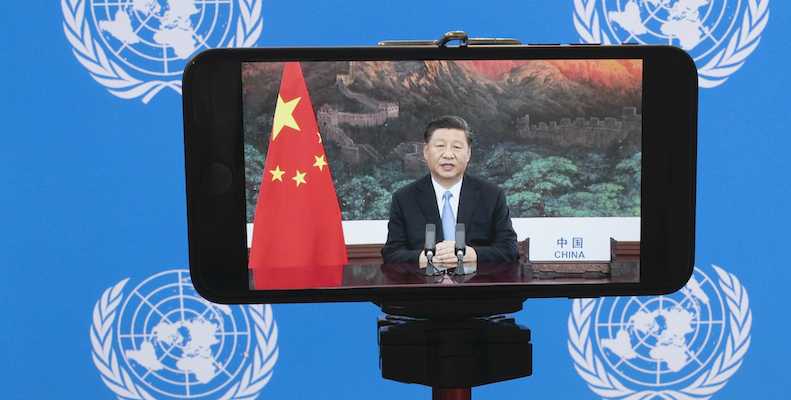When last summer the UN Human Rights Council expressed itself on the disputed national security law approved by China to have greater control over Hong Kong, 53 countries supported the new Chinese rule, and only 27 opposed it. The law had ended up at the center of the attention of half the world, because several Western governments feared that it could be used by China to suppress the pro-democracy protests that had been going on for about a year in Hong Kong (and for this reason we came to talk about the “end of Hong Kong»). However, the Chinese government had managed to bring to its side the UN Human Rights Council, a subsidiary body of the General Assembly which – at least on paper – should be concerned with promoting respect for human rights in the world.
The decision of the Council was commented a lot, but it did not surprise those who had followed the dynamics of power within the UN for some time. What happened then?
Over the last few years, China has significantly increased its influence in various international organizations, hitherto mostly the expression of a system – the Western and multilateral one – set up by the United States at the end of the Second World War. China has not limited itself to becoming friendlier, or seeking the support of more and more countries. It did something more: it launched a long and broad campaign “which aims to bend the arc of global governance towards a more illiberal orientation, which privileges the interests of authoritarian actors”, wrote journalist Kristine Lee his Politico. This campaign was seen above all within the UN, the symbolic organization of the current international system.
Over the past few years, the Chinese government has systematically placed Chinese officials and politicians in charge of a large number of UN agencies.
Since 2019, the United Nations Food and Agriculture Organization (better known as FAO) has been led by Qu Dongyu, former Chinese Deputy Minister of Agriculture. Qu Dongyu’s appointment followed the reconfirmation of Zhao Houlin, former Chinese Minister of Posts and Telecommunications, as Secretary General of the International Telecommunication Union, a very important agency that is responsible for establishing, among other things, the technical criteria for networks. of communication. Zhao had used his position to promote the Chinese company Huawei as a distributor of 5G systems around the world.
The President of the Italian Council, Giuseppe Conte, and the director of FAO, the Chinese Qu Dongyu (AP Photo / Alessandra Tarantino)
–
The previous year, the UN Secretary General, António Guterres, had appointed Liu Zhenmin, former Chinese Deputy Foreign Minister, to a key position within the Department for Economic and Social Affairs, a UN body that aims to promote social and economic development, combat climate change and reduce inequalities. China also leads the International Civil Aviation Organization and the Industrial Development Organization, which the Chinese government has used to positively present the projects of the Belt and Road Initiative, the infrastructure plan with which China is expanding its communication routes and influence around the world, Italy included.
China was also about to take the lead of the World Intellectual Property Organization last March, before the joint efforts of the United States and other countries prevented it. Of the 15 specialized agencies of the UN, China today leads four, surpassing any other country in the world.
Having control of so many agencies, said Ashok Malik, an advisor to the Indian foreign ministry, has relevant implications for China: “If you control the important levers of these institutions, you can influence their norms, ways of thinking, influence politics. international, you condition it with your way of thinking ». At the same time, it also had quite low costs. Although China is the second largest economy in the world, it continued to benefit from discounts granted to developing countries: in 2018 it contributed to the UN’s expenses with only 1.3 billion dollars, far less than the 10 billion established for United States.
Moreover, in recent years, China has set up a system of mutual favors with several African and Pacific countries, with which in exchange for loans and other assistance systems it is able to obtain the favorable vote on individual issues dealt with. to the United Nations.
Such a thing happened last year, when the United Nations Food and Agriculture Organization (FAO) voted for the new head in Rome. China sought support for Qu Dongyu, its candidate, among developing countries: when the Chinese government, for example, canceled $ 78 million in debt to Cameroon, Cameroon’s candidate for the UN post, the economist Médi Moungui, abruptly withdrew from the competition, without giving too many explanations. It also seems that the members of the particularly large Chinese delegation had asked representatives of other states to photograph their ballot, in order to confirm that they had voted for Qu Dongyu: and this despite the fact that the vote was secret.
– Read also: The United States is no longer there
The rise of China, inside and outside international organizations like the UN, has largely depended on progressive withdrawal of the United States from world affairs, and by the system that the American government itself had created at the end of the Second World War to secure a position of dominance in the global system. This process began several years ago during Barack Obama’s presidency, but has become faster and more traumatic with Donald Trump.

US President Donald Trump and Chinese President Xi Jinping (AP Photo / Susan Walsh, File)
–
In July Trump had decided to withdraw the United States from the World Health Organization, accusing the UN agency of being dependent on China and of having contributed to the spread of the coronavirus pandemic. Trump had previously made similar decisions, albeit not directly related to US participation in the UN: in 2017 he had withdrawn from the climate treaty, and the following year from the Iran nuclear deal. At the vote on the national security law passed by China for Hong Kong, held in July at the UN Human Rights Council, the United States was not there: Trump had withdrawn them in 2018, arguing that the body was too critical against Israel (ally of the Americans). The following year he had done the same with another agency, the United Nations Educational, Scientific and Cultural Organization.
Many, both inside and outside the US government, have seen Trump’s moves as a kind of “strategic gift” to China. Trump wouldn’t just free up space for his opponents; he would have done so without being able to claim it again in the future. As Lanxin Xiang, director of the Center of One Belt and One Road Studies in Shanghai said, “If this is your voluntary retreat, and not the result of us chasing you, filling in the empty spaces shouldn’t be considered a provocation” .
– Read also: Are the allegations against the WHO well founded?
The United States has tried in part to oppose the rise of China, trying to persuade and woo several historically friendly countries. So far, however, these efforts have produced very little: over the past four years, trust between Trump and allies has been progressively crumbled, and today almost nothing remains of the bilateral relations inherited from the Obama mandate.
According to some observers, what is being seen inside the UN is increasingly reminiscent of the dynamics of the Cold War, that is, the clash between two different models – on the one hand the United States, on the other the Soviet Union – which since the end of the Second War world defined the world and its equilibrium for over half a century: “Beijing’s weight in the United Nations helps the Chinese Communist Party to legitimize its claim to be a superior alternative to Western democracies,” wrote the Wall Street Journal. A similar concept was recently expressed by the Chinese president himself, the potentissimo Xi Jinping. In his speech to the UN General Assembly, alluding to the rise of China and the decline of the United States, Xi said: “The global governance system should adapt itself to evolving global political and economic dynamics.”
Which in other words means: we are becoming the most important country in the world, the world should recognize it and change its system of government, giving us the lead.
–


